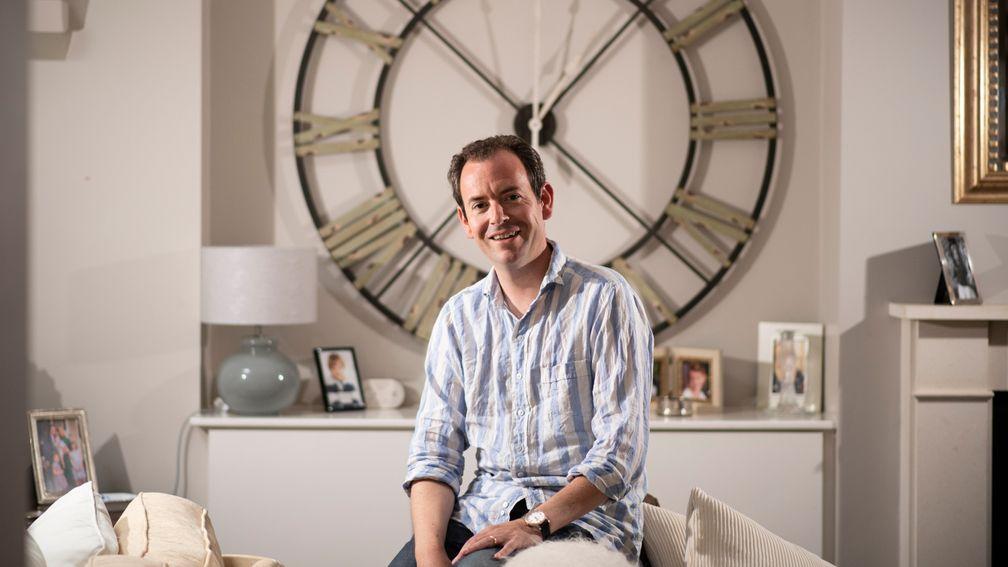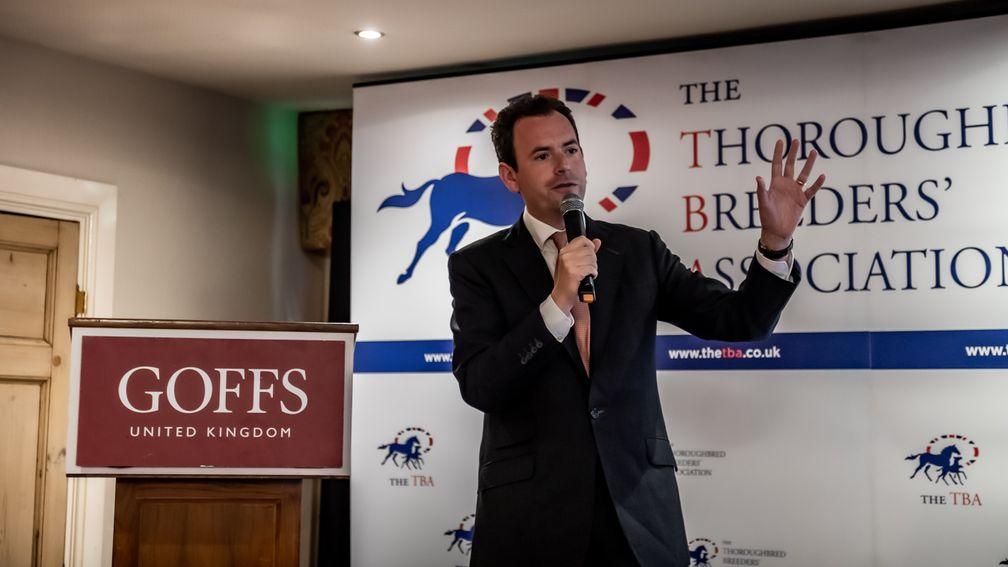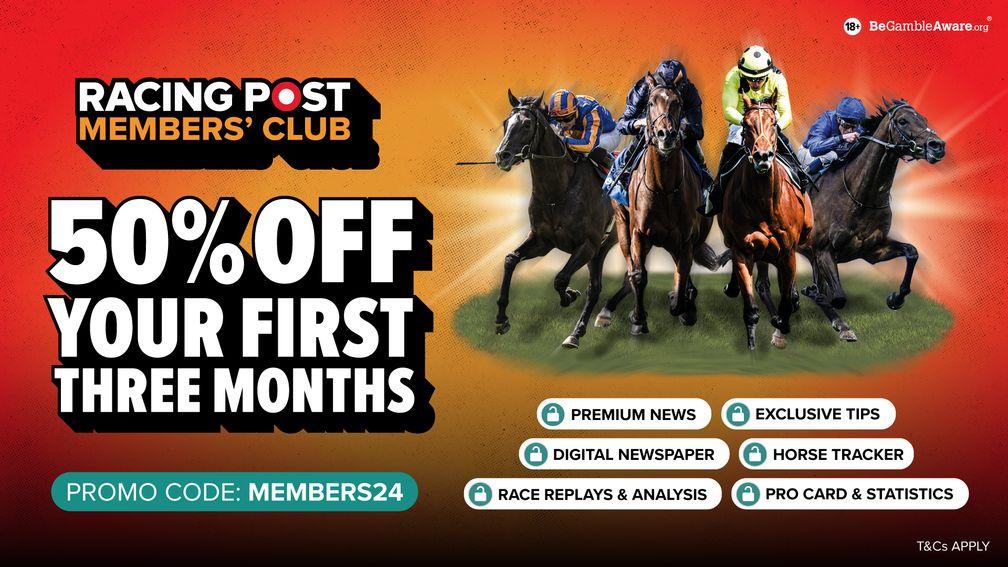Nick Luck: 'I said then I could die a happy man. And weeks later I nearly did'

In this interview first published for Racing Post subscribers in November 2020, Lee Mottershead caught up with the top racing broadcaster Nick Luck. The TV frontman celebrates his 46th birthday on Friday and to mark the occasion we have republished the article free to read.
Members' Club Ultimate subscribers have access to fantastic features like this and daily insight from our award-winning team of journalists, writers and tipsters.
Racing Post Members' Club is the ultimate racing subscription and you can subscribe with 50% off your first three months with code WELCOME2024.
By subscribing, you'll unlock exclusive daily emails, premium tips, unlimited access to the digital newspaper and much more. Renews at full price and terms apply.
Nick Luck is at home. In a normal year he might not have been. Had last year turned out differently, he might not be anywhere.
If awards are a reliable guide, Luck is the pre-eminent racing broadcaster of his generation. Right now, he is a man holding an infant miniature schnauzer. On seven occasions Luck has been named number one at the Horserace Writers and Photographers Awards. For the last five days he and wife Laura have been mopping up both number ones and number twos.
The guilty party is a small but exquisitely bred hound called Mack. His real name, Buffingham Sea Breeze, is unlikely to be shouted when he goes for walkies in the handsome streets of Teddington, the south-west London suburb that is also home to the Lucks' three daughters, ten-year-old Clemmie, Hebe, aged eight, and Xanthe, who at two years old had been the newest addition to the household until the puppy came along.
"He's peed and crapped everywhere, but he's pretty good," says Mack's master, who at 11 o'clock this midweek morning has already recorded the latest edition of his Nick Luck Daily podcast.
The audio offering's success should have come as no surprise. Luck seemingly makes a success of everything. The 42-year-old is both extremely knowledgeable about the sport but also gifted at conveying that knowledge through whatever medium or platform he occupies at any given time.

As well as hosting Racing TV's coverage of the channel's major meetings, he has become a blend of Andrew Marr and Michael Parkinson when anchoring Luck on Sunday, the chat show that is required viewing for those with an involvement or serious interest in racing.
The compere of numerous functions – and also a director of Aintree – is no longer a constant presence on terrestrial television since the demise of Channel 4 Racing, although he did host this year's most-watched television racing event, ITV's Virtual Grand National.
The list goes on and on but, in edited highlights, Luck continues to be heard on what used to be called proper telly as the BBC's equestrian commentator. Perhaps even more impressively, he is a wanted man in the United States and a key member of NBC's racing team, including at the Breeders' Cup.
Had coronavirus not invaded the world, Luck would by now have completed a rare broadcasting double. For NBC he should have been at Churchill Downs, Pimlico and Belmont for the Triple Crown. For the BBC he should have been in Japan to call the showjumping, eventing and dressage at the Tokyo Olympics.
The pleasures have hopefully only been deferred until next year but they still trigger a reciting of Jim Bowen's most famous Bullseye catchphrase.

"Look at what you could have won," says Luck with a smile. He also says it with no self-pity, mindful of what could have happened in the early summer months of 2019. In what proved to be the second consecutive year of emotion and trauma for the family, Luck had a brief dalliance with death.
"I have no pain threshold and I'm a bit of a hypochondriac," he confesses, pointing out he showed no hesitation in seeking medical treatment for the abdominal pain that had troubled him for 18 months.
No obvious problem could be found. Luck thought he may be stressed. He also knew he was excited. His lifelong ambition had been to work at the Kentucky Derby. Sixteen months ago the dream came true.
"It was the amazing experience I hoped it would be," says Luck. "At dinner that night, my colleague Britney Eurton said to me, 'So, you've done your first Derby, how do you feel?' I told her I could now die a happy man. What I didn't realise is two and a half weeks later I would give that a fairly good shot."
He returned home, felt poorly, was diagnosed with irritable bowel syndrome and then returned to the US for the Preakness Stakes.
"Getting back on a plane was the worst thing I could possibly have done," he admits. "I felt so ill that as soon as I got into my hotel room I just lay in the bath for an hour.
"On Preakness day, my base was the bacchanalian Pimlico infield. It's an assault on the senses, with half-clothed people having a ridiculously good time. It took my mind off everything and completely anaesthetised the pain but the following day I started to feel funny again – and then on the flight to London it really hit me."
But he carried on. After arriving back home, he showered, got dressed and then left again, this time bound for Doncaster to lead the Thoroughbred Breeders' Association's National Hunt Awards dinner. Once that gig was completed, he drove back to Teddington, arriving in the early hours of what was Breakfast with the Stars morning at Epsom. He was the main man there as well.

"That night I was in horrific pain but I didn't want to go to hospital at 3am," he says. "I had a couple of days off, so I decided to go to A&E and read a book. After the CT scan a surgeon came to see me and said I would be staying in hospital. I hadn't expected that at all.
"The surgeon went in for a look the next morning. When I woke from the operation, I glanced at the clock and realised it was later than I had anticipated. I told the surgeon I really wanted to know what was wrong. It was then he revealed he had taken a large mass out of my small intestine and resectioned my colon. He intimated it was probably quite sinister.
"I went back to the ward, where Laura was worried because it had been six hours since I went down to theatre. I was completely off my face on tramadol and fentanyl. Being the considerate husband I am, I removed the oxygen mask and told Laura, 'Not good at all. I'm f****d.' Then I put the mask straight back on and conked out."
Six days were spent in Kingston Hospital. "I was convinced I would be going back for cancer treatment, but they rang me ten days later to say the tumour was benign," he says. "I had the luckiest break ever. It was complete elation. I knew I could get on with the rest of my life."
He did so with such gusto he was well enough to be at Royal Ascot for NBC, whose executive racing producer Rob Hyland had made a day trip from New York to visit the patient in hospital.
Luck also started to work on his fitness and terminated a smoking habit that had lasted over two decades. "I don't miss it at all," he says. "If you have a bit of a whiff of your own mortality you're going to be a bit more sensible."

A boy can still treat himself, which he does to the chocolate cake and cookies bringing calories and cheer to the kitchen table. We have spoken about the life-changing events of 2019. We now rewind to 2018, the year in which Xanthe was born on April 26.
A little over two weeks later Luck was at York, where the Dante meeting was due to begin the following day. Laura rang him to say the family's health visitor had just called to say she was coming over to the house with a nurse from the Royal Brompton Hospital. Luck immediately sped south. By the time he got home, Laura had already been informed Xanthe almost certainly had cystic fibrosis.
"The way in which the NHS scoops you up and guides you in a situation like this is staggering," says Luck. "I had just thought of cystic fibrosis as a life-limiting lung condition. That's only part of it. Within 48 hours you are almost an expert because you are schooled so intensively.
"Laura has a beautiful voice and Clemmie takes after her. That evening, the same day we found out the news about Xanthe, Clemmie was taking part in a school concert. As we sat in the assembly hall and she began to sing, a tear ran down my cheek.
"Then I thought, 'Come on, you need to be strong here and push forward.' We both resolved to set an example to the kids that our lives were not going to be taken over by Xanthe's diagnosis. We were going to work through it together."
The work is going well. Xanthe has a cupboard full of medication but takes it happily, more happily than she is currently tackling a bowl of pasta, very likely put off by the presence of a strange journalist and photographer at her lunch table.

"She is pretty smart for her age," says Luck, who points out life expectancy for those with cystic fibrosis has improved dramatically in recent years.
"There must be something in her that knows she is doing stuff her sisters don't have to do. Does she think that's a function of her age or does she recognise there is some element of difference between them? That's going to be our next biggish challenge."
Taking on that challenge with her husband will be Laura, a Royal Academy of Music-trained artist who is currently giving a singing lesson a few feet away.
The door to the room with the piano may be closed but the house is literally filled with the sound of music as she works with her two students through the gorgeous title song to the musical of the same name. When the lesson ends, she enters the kitchen where her husband, who forever appears to be working, is now talking about forever appearing to be working.
Last year he was away for 140 days, either travelling around Britain or abroad. "I honestly don't know why I do so much," he says. "I do know I'm very bad at saying no to anything. It's quite a hard question to answer, though. Let's have another cup of tea."
He makes the tea, details a problem with drainage in the house and then thinks again about the question.

"Why do I do so much?" he asks rhetorically. "One reason is I really enjoy it. I'm also probably not sufficiently organised to say no to things. There is an element of chaos to me.
"I'm fully aware I need to take more holidays and it's absolutely going to be my guiding principle for 2021. I need to block out a certain number of weeks and say I'm going to do no work in those weeks. If I don't, I'm going to drive myself and Laura mad."
There is a pause before further reasoning is offered. "The major change in my working life, which was when Channel 4 Racing finished, has informed quite a lot of what I do. When that stopped, 80 per cent of my income was turned off overnight.
"I needed a slightly different mindset. That might explain why I'm not eager to turn stuff down and why I've become more switched on about attacking opportunities."
Luck had been part of the Channel 4 team for eight years before becoming its principal presenter – outside of the days when Clare Balding was available – across the 2013-to-2016 era during which the network assumed exclusive rights.
Helped by the advent of bookmaker advertising, Channel 4 ousted the BBC, while Channel 4 also ousted the Highflyer production company that had previously made the programmes. In came IMG, out went some familiar faces and, on the second day of Kempton's 2016 Christmas festival, also out went Channel 4 Racing, Luck saying the final goodbyes just five days before ITV Racing arrived.

"They are the four years the sport seems keen to erase from everyone's memory," says Luck. He argues the rights victory that delivered Channel 4 the Grand National and Royal Ascot was "a bad election to win", given Channel 4 showed how racing could be monetised by a commercial broadcaster, inevitably sparking the interest of ITV, a much bigger beast in the jungle.
"I don't really have any rancour about the way things turned out," he says. "That's just the way television is. It's about trends, fashions, what's hot and what's not, who's hot and who's not.
"If you asked me now, would I like to be somewhere near the forefront of racing's coverage on national television, well, of course I'm going to say yes. There is a massive difference in the adrenaline rush when you're presenting the Grand National on mainstream television compared to a racing channel. There are no two ways about that.
"When Channel 4 lost the contract, my confidence was shaken. I was wondering if the sport thought I was fundamentally just the wrong person to be doing the job?
"A lot of people I respect advised me to get out of racing and do something else, go abroad full time or completely move away from broadcasting. But why would I walk away from something I really love doing? I love every aspect of the sport, which is why doing Sunday mornings and this new podcast venture suit me well. They are all-encompassing. I get to talk about everything."
The ace interviewer has now been an absorbing interviewee for nearly two hours. Edward Whitaker needs to take some pictures and wants to capture Luck with Laura, Xanthe and Mack.

"Don't shit on the rug – no, not you, Edward," says Luck, before later expressing concern when Mack goes into the garden, fearful the little lad could be eaten by the neighbours' German Shepherd.
Pleased to report, the dog survived, while the podcast – described by Laura as "the f****** podcast" – and the Sunday mornings also continue to flourish. Indeed, Luck's ambition is to take a vehicle like Luck on Sunday to a mainstream channel.
"It has brought me a lot of pleasure," he says. "I'm pleased with how it has developed and it's now reached the stage where we probably ought to try one or two new things."
The podcast, launched on July 1, is a wonderful new thing. "I half had the idea last year," says Luck. "I thought there was some scope for a daily audio offering, a bit like The Times and The Spectator do with politics. I'm enjoying it and the numbers are building steadily."
Given his name is in the title of the programme and the podcast, Luck is plainly central to why both are performing so well. Spend time with him and you can see why.
Much more than most, he has an innate feel for racing. It took a while for medics to diagnose his problem last year. Luck can see through racing much more clearly.

"As a sport that uses animals for enjoyment, racing is always on the edge of cultural relevance, but I do think it's more aware of its own shortcomings than people think," he suggests.
"It is very political and riven with division, often to its detriment, but it does have a canny survival instinct. Sometimes I think it's that simmering tension that allows it to survive. Racing is a bit like a less unpleasant version of the Tory party."
It's a great line, as one would expect of a multiple racing broadcaster of the year – but can he remind us, how many times has he collected the trophy?
"Seven," he says instantly, before laughing. "I should have paused a bit longer before saying that. It's very flattering but it also shows a chronic lack of imagination on the part of the racing media. Having said that, it has been a long time since I won it, so I can't remember how it feels."
As sure as night follows day, that feeling will return.
Read these next:
'Having my counsellor is a big help - I don't feel anything I bring to her is too much'

Subscribe to Racing Post Members' Club Ultimate Monthly and get 50% off your first three months!
Available to new subscribers purchasing Members' Club Ultimate Monthly using code MEMBERS24. First three payments will be charged at £24.98, subscription renews at full monthly price thereafter. To cancel please contact us at least seven days before subscription is due to renew.
Published on inInterviews
Last updated
- 'You can see why people end up struggling - when you're trying to pay the electric bill, losing one ride can be massive'
- 'I've never paid six figures for a horse and never will - I learned pretty quickly you're only one phone call away from f*** all'
- 'I’ve trained some fabulous horses, worked with some excellent riders - maybe I have brought a little bit of talent to the table as well'
- ‘When you’re in the moment and you’re starved, you’re ready to explode - everything built up and I just lost my s**t’
- 'He must have his breakfast earlier than Willie does' - Patrick Mullins goes behind enemy lines at Gordon Elliott's yard
- 'You can see why people end up struggling - when you're trying to pay the electric bill, losing one ride can be massive'
- 'I've never paid six figures for a horse and never will - I learned pretty quickly you're only one phone call away from f*** all'
- 'I’ve trained some fabulous horses, worked with some excellent riders - maybe I have brought a little bit of talent to the table as well'
- ‘When you’re in the moment and you’re starved, you’re ready to explode - everything built up and I just lost my s**t’
- 'He must have his breakfast earlier than Willie does' - Patrick Mullins goes behind enemy lines at Gordon Elliott's yard
